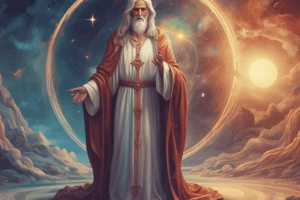Podcast
Questions and Answers
What is the central concept of incarnation in various religious and philosophical traditions?
What is the central concept of incarnation in various religious and philosophical traditions?
The belief that a divine being or a higher power takes on human form or becomes embodied in a human being.
What is the term used in Hinduism to describe the descent of a deity or supreme being into the physical world?
What is the term used in Hinduism to describe the descent of a deity or supreme being into the physical world?
Avatara
What is the term used in Christianity and Judaism to describe a manifestation of God or a divine being in human form?
What is the term used in Christianity and Judaism to describe a manifestation of God or a divine being in human form?
Theophany
In Buddhism, what is the concept of a Buddha or enlightened being taking on human form to teach and guide others?
In Buddhism, what is the concept of a Buddha or enlightened being taking on human form to teach and guide others?
What is the divine nature of an incarnate being, according to religious traditions?
What is the divine nature of an incarnate being, according to religious traditions?
What human experiences is an incarnate being subject to, according to religious traditions?
What human experiences is an incarnate being subject to, according to religious traditions?
What is the mission or purpose of an incarnate being, according to religious traditions?
What is the mission or purpose of an incarnate being, according to religious traditions?
Who is believed to be the incarnation of God in Christianity?
Who is believed to be the incarnation of God in Christianity?
Who is considered an avatar of the god Vishnu in Hinduism?
Who is considered an avatar of the god Vishnu in Hinduism?
What is the common thread among various religious traditions' concepts of incarnation?
What is the common thread among various religious traditions' concepts of incarnation?
Flashcards are hidden until you start studying
Study Notes
Definition and Concept
- Incarnation refers to the belief that a divine being or a higher power takes on human form or becomes embodied in a human being.
- This concept is central to various religious and philosophical traditions, including Christianity, Hinduism, and Buddhism.
Types of Incarnation
- Avatara (Hinduism): The descent of a deity or supreme being into the physical world, often to restore balance and order.
- Theophany (Christianity and Judaism): A manifestation of God or a divine being in human form, often to communicate with humans or to intervene in human affairs.
- Buddhist Incarnation (Buddhism): The concept of a Buddha or enlightened being taking on human form to teach and guide others.
Key Features and Characteristics
- Divine Nature: The incarnate being is believed to possess divine qualities, such as omniscience, omnipotence, and benevolence.
- Human Experience: The incarnate being is subject to human experiences, such as suffering, temptation, and emotions.
- Mission or Purpose: The incarnate being is often believed to have a specific mission or purpose, such as redeeming humanity or teaching spiritual truths.
Examples and Instances
- Jesus Christ (Christianity): Believed to be the incarnation of God, sent to redeem humanity from sin.
- Krishna (Hinduism): Considered an avatar of the god Vishnu, who descended to earth to restore balance and order.
- Buddha (Buddhism): The historical figure Siddhartha Gautama, who is believed to have achieved enlightenment and taught the path to nirvana.
Theological and Philosophical Significance
- Revelation: Incarnation is often seen as a means of divine revelation, where the divine being communicates with humans in a way that is relatable and understandable.
- Salvation: Incarnation is sometimes linked to the concept of salvation, where the incarnate being provides a means for humans to attain spiritual liberation or redemption.
- Theodicy: Incarnation raises questions about the nature of evil and suffering, and how a divine being can be reconciled with the existence of evil in the world.
Studying That Suits You
Use AI to generate personalized quizzes and flashcards to suit your learning preferences.




